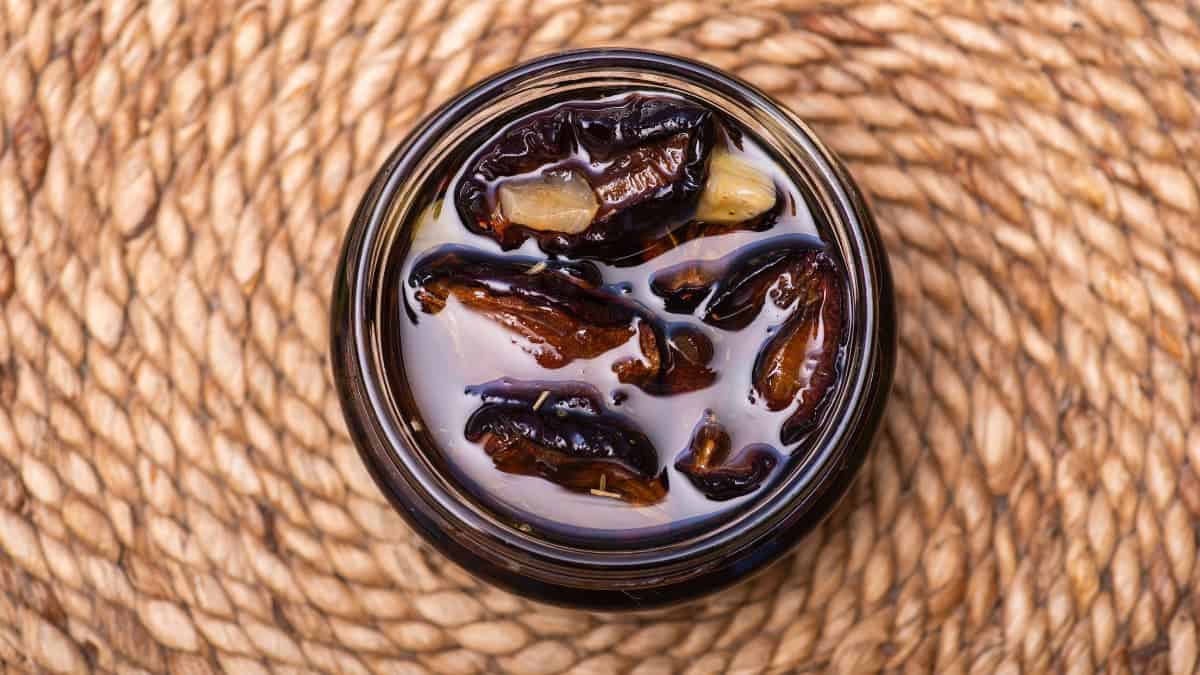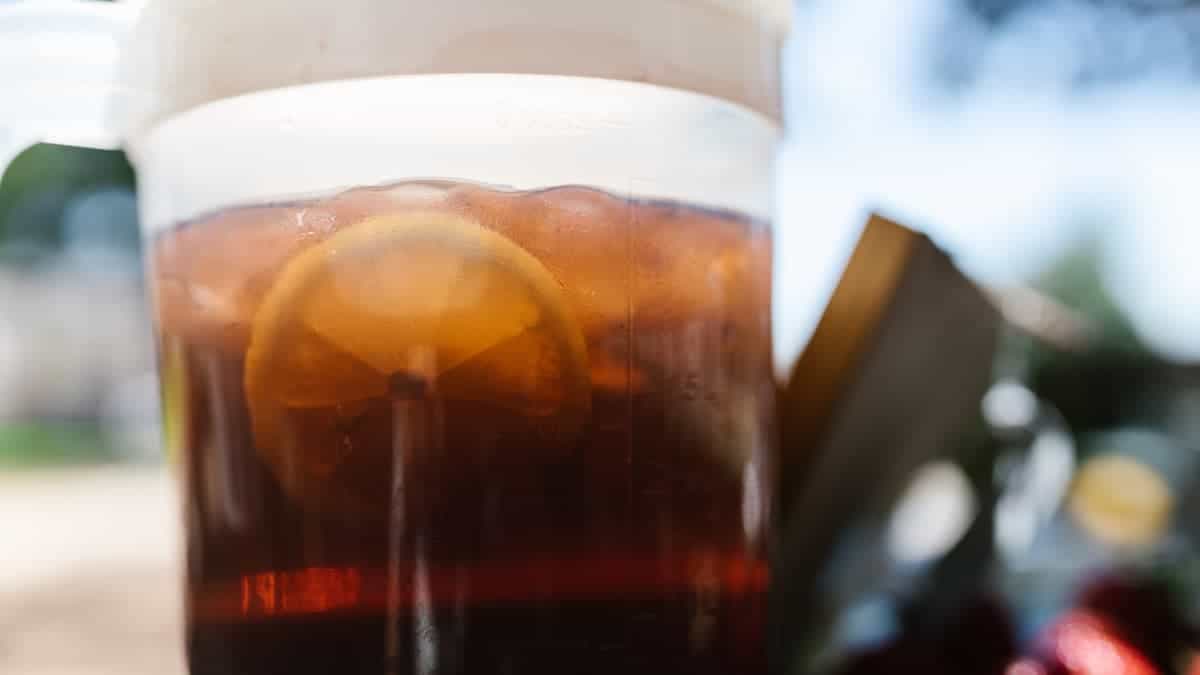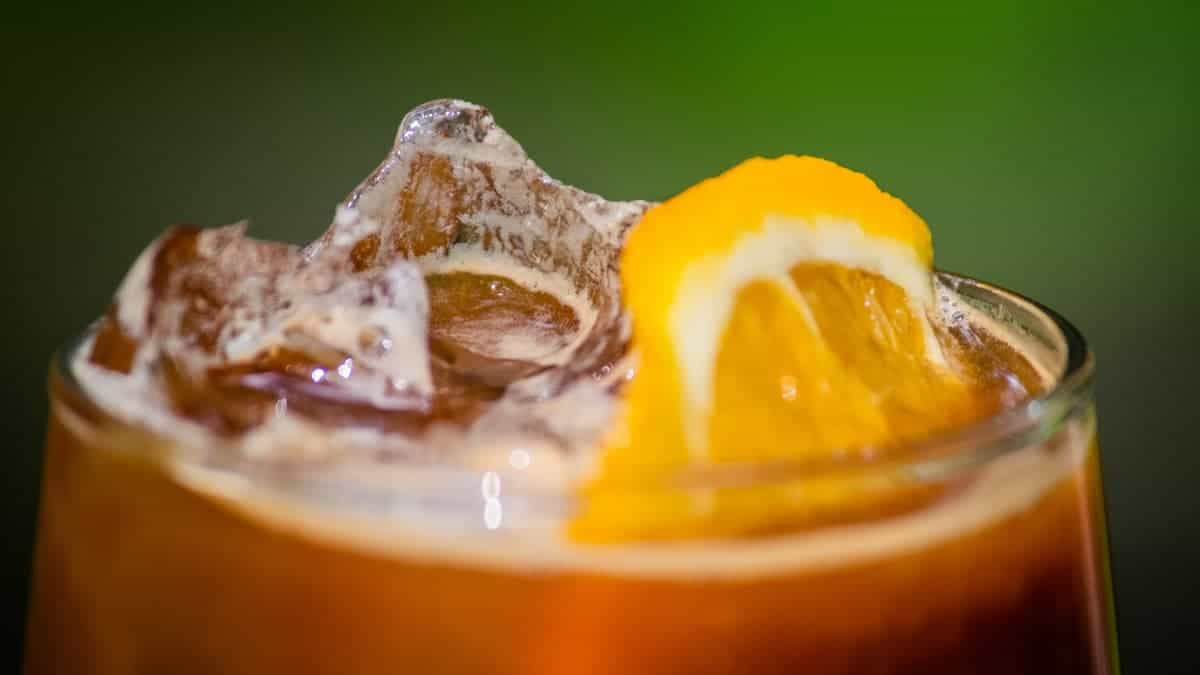How Much Caffeine in Iced Tea?
There are few things as refreshing as iced tea on a hot afternoon. People of many cultures consume tea for a variety of reasons — flavor, ritual, health benefits, and yes, caffeine. But exactly how much caffeine does iced tea contain?
Well, it depends on a bunch of different factors. Iced tea contains roughly 10-75 milligrams of caffeine per serving. But that’s a pretty wide range.
In this article, we’ll look at home brews and bottled brands to discern exactly how much caffeine is in iced tea.

Key Takeaways: Caffeine in Iced Tea
- A traditional iced tea contains 10-75 mg of caffeine per 8-ounce serving.
- Several factors impact the amount of caffeine in iced tea.
- Many brand-name bottles of iced tea have more caffeine than popular sodas.
- Iced black tea drinks will contain more caffeine than iced green tea drinks.
How Much Caffeine Does Iced Tea Have?
Iced tea contains approximately 10-75 mg of caffeine per 8-ounce serving.
Several factors impact this number: water temperature, tea type, tea quality, leaf shape, and steep time.
First, let’s talk about water temperature. Unlike hot tea, you can make iced tea by brewing the tea in cold water as well as hot water.
In simplest terms, hotter water increases the caffeine content in your cup of tea. So you’d think hot tea would have more caffeine than iced tea. (Or “ice tea” as some people call it.)
But temperature isn’t the only factor. The longer you steep tea leaves in water, the more caffeine it releases. Steeping tea in cold tea takes a longer time than steeping it in hot water.
In other words, the amount of caffeine in hot tea is pretty much the same as in iced tea.
This, of course, assumes you’re using the same type of tea.

White, green, oolong, purple, pu-erh, and black tea all come from the same plant. The leaves of this plant naturally contain caffeine. The exact type depends on how growers have farmed and processed the tea.
Traditionally, iced tea uses black tea. Black tea leaves are heavily oxidized and contain the most caffeine.
Herbal teas and tisanes do not come from the Camellia sinensis plant. Thus, they do not contain caffeine — hot or iced.
Whole tea leaves release less caffeine than crushed tea leaves or powder. (This is part of why matcha powder contains more caffeine than black tea.)
Brand quality can also play a role in determining the caffeine in iced tea. Better brands are more likely to use higher-quality tea and a more polished manufacturing process. This standardization leads to more consistent caffeine measurements.
Even strong black iced tea contains less caffeine than coffee. The caffeine in tea also affects the brain differently than that in coffee. The presence of polyphenols in tea means the delivery is more consistent and less jumpy.
Iced Teas Caffeine Content Compared
Home-Brewed Iced Tea
If you’re steeping tea at home, these measurements assume you’re using a single teabag per 8 oz of water. (And that you’re following steeping instructions on the box.)
- Lipton Iced Tea: 55 mg caffeine
- Bigelow Black Tea: 30-60 mg caffeine
- Tetley Iced Tea Blend: 40 mg caffeine
- David’s Tea Cold Brew Black Tea: 40 – 60 mg caffeine
- Celestial Seasonings Cold Brewed Iced Tea: 50-70 mg caffeine
- Tazo Black Iced Tea: 30-60 mg caffeine
Remember, these measurements are approximate as many factors can come into play.
Store Bottled & Canned Iced Tea
You can buy pre-made iced tea pretty much everywhere. Good news! The caffeine content is more standardized for bottled or canned iced tea. Let’s look at some common name-brand iced tea drinks.
- 4C Iced Tea Mix (standard lemon): 2 mg per mixed 12 fl oz
- Lipton Brisk: 11 mg per 12 fl oz
- Arizona: 15 mg per 8 fl oz
- Honest: 90 mg per 16.9 fl oz
- Pure Leaf: 63 mg per 16.9 fl oz
- Tazo: 31 – 45 mg per 13.8 fl oz
- Gold Peak: 48 mg per 18.5 fl oz
Coffee & Fast Food Chains
Fast food and drink chains often offer their own take on hot tea and iced tea as part of their drinks menu. Let’s look compare the caffeine content of iced tea from common chains around the world.
- Starbucks Iced Tea: 25 mg per 16 ounces
- Dunkin Iced Tea: 67 mg per 16 ounces
- Seattle’s Best Iced Tea: 45 mg per 16 ounces
- McDonald’s Iced Tea: 125 mg per 21 ounces
- Wendy’s Iced Tea: 32 mg per 16 ounces
- Chick-Fil-A’s Iced Tea: 62 mg per 16 ounces
- Jack in the Box’s Iced Tea: 48 mg per 20 ounces
Iced vs Brewed Tea Caffeine

Iced and hot brewed tea contain roughly the same amount of caffeine per serving. The main factor that influences the caffeine in tea is tea type.
Iced Black Tea vs Brewed Green Tea
Iced black tea contains, on average, 45 mg of caffeine per serving. Brewed green tea contains around 28 mg per 8 ounces. So iced green tea has about half as much caffeine as iced black tea.
Iced Black Tea vs Brewed White Tea
Brewed white tea contains even less caffeine than brewed green tea. It is the least caffeinated tea type — only around 20 mg of caffeine per 8-ounce serving on average. Compare this to 45 mg of caffeine per serving in iced black tea.
Iced Black Tea vs Brewed Matcha Tea
A typical 8-ounce cup of matcha tea contains approximately 70 milligrams of caffeine. Matcha tea is far more caffeinated than other types of green tea and brewed and iced tea. Why? When drinking matcha tea, you’re consuming the actual tea leaves in the beverage. So you intake the full amount of caffeine available in the plant.
Iced Black Tea vs Brewed Decaf Black Tea
Brewed black tea contains approximately 2 mg of caffeine per 8-ounce serving. So decaf cuts caffeine content by almost 95 percent compared to regular black tea.
What Are the Most Popular Iced Tea Brands?
There’s a huge number of iced tea brands lining the shelves. Which ones are worth your moolah? Here are my top 10 picks.
- Arizona: This iconic brand offers a variety of iced teas at a low price. Flavors range from classic lemon black tea to honey green tea.
- Gold Peak: A family-run tea company, Gold Peak delights in simple and delicious iced tea recipes. Offering a range of flavors and sweetness levels, it’s easy to find something you love.
- Honest Tea: Honest tea is great because they use 100% organic and fair trade ingredients in the beverages. Not to mention, they’re delicious!
- Pure Leaf: Pure Leaf is a tea brand focused on providing a pure experience. (They’re proprietors of the “you’re only as good as your ingredients” principle.) Tea purists will especially appreciate the quality of their brews. Their unsweetened iced tea is excellent.
- Snapple: The glass bottle and snapping top of the classic Snapple hold a special place in many hearts. With a huge number of flavors, Snapple is a delicious and high-quality iced tea brand worth trying out.
- Tazo: Tazo makes iced tea that focuses on channeling the health benefits inherent in tea. But this Pacific Northwest company also creates concoctions that are pleasures to drink.
- Lipton: Nearly synonymous with tea in the south, Lipton has been brewing black tea since 1880. It specializes in traditional iced tea but also offers other flavors.
- Sweet Leaf: Sweet Leaf is an iced tea brand headquartered in Austin, Texas. They also brew organic teas with cane sugar, using the founder’s grandmother’s secret recipe.
- Teavana: Teavana is a subsidiary of Starbucks; if you’ve ever had Starbucks tea, you’ve sampled Teavana.
- Milo: Founded in 1964, Milo is a women-owned and operated company adhering to community-oriented, zero-waste principles. Their signature sweet tea, the original, is Milo at its best.
Many of these brands also sell bags for hot tea.
Iced Tea Caffeine vs Soda Caffeine
Iced tea contains 45 mg of caffeine, on average, per 8-ounce serving. That fleshes out to around 67 mg per 12 ounces. Compare that to 12-ounce servings of popular sodas:
- Coke: 34 mg caffeine
- Diet Coke: 46 mg caffeine
- Pepsi: 39 mg caffeine
- Mountain Dew: 54 mg caffeine
- Sundrop — 64 mg caffeine
- Dr Pepper: 43 mg caffeine
Surprisingly, iced tea contains more caffeine than most of these sodas by serving. The most comparable soda to iced tea by caffeine content is Sundrop.
Wrapping Up
Iced tea contains between 10 and 75 mg of caffeine per 8-ounce serving. But the exact number can vary dramatically.
Tea quality, water temperature, steep time, and more can impact the amount of caffeine in iced tea.
Though not as caffeinated as coffee, iced tea is a refreshing drink for hot summer afternoons.

